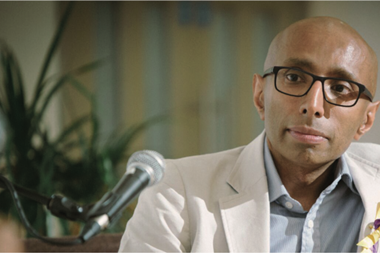Investors’ approach to value creation could be a drag on efforts to achieve global sustainable development goals, according to the chief financial officer (CFO) of global food company Danone.
Speaking in Paris at the PRI’s annual responsible investment conference, Danone’s Cécile Cabanis spoke of the need for a new mindset that did not look at value from a “yearly profit and loss [P&L] point of view” but considered externalities.
Asked by Eva Halvarsson, CEO of Swedish buffer fund AP2, what her message to investors would be about how they could support companies’ work on the UN Sustainable Development Goals (SDGs), Cabanis said simply: “Join us.”
She proceeded to explain how Danone had reached an agreement, with its banks, to tie the interest rate on a €2bn loan to the pace at which it achieved its goals for ‘B Corp’ certification – “for us the most demanding standard in terms of environmental, social and governance performance”.
“These 12 banks agreed that if we were going at the right pace in being certified B-Corp it was less risk to the business or more value to the business, beta or alpha, it depends on the way you want to measure it,” she said. “This is tiny, it’s a drop in the ocean, but it shows that it’s moving.”
“The reality is that you will know it’s moving not when we talk about it but when investors are ready to put it in their decision of investment,” she added.
She appeared to suggest that this had not yet happened.
“Today if you look at what they do, they do their job, they have probably incentive that relates to their Excel return model and we can’t blame them,” Cabanis said, “but we need to shift the conversation and we need to make sure we are clear on the risk avoidance and the value creation and that we can measure the externalities with them, so that when it comes to take a decision we are not only looking at what we are used to looking at in the 1980s [such as] P&L, discounted cash flow.”
There was a “tension” between the short-term and the long-term agenda, Cabanis said, and Danone took the view that this needed to be managed when making decisions about resource allocation.
“It’s difficult, it creates a lot of tension, but it’s necessary, and if we can’t have this conversation with investors I think it will not happen fast enough and we won’t be able all together to create material sustainable change.”
At a Deutsche Bank consumer conference earlier this year Cabanis – according to a transcript from the event – spoke about how the company needed, on a daily basis, to keep “the right tension between delivery of the short term and transformation in order to make sure that we can rebuild value in the food system and we can really ensure that we are walking towards the goals for 2030 under the One Planet, One Health vision.”
At #PRIinPerson today, I shared the urgency to revise the way we approach value to ensure we can make meaningful progress towards the SDGs at the right pace pic.twitter.com/UkU6NyiVAZ
— Cécile Cabanis (@CecileCabanis) September 10, 2019
ESG reporting ‘a mess’
Cabanis also spoke about what she referred to as reporting – information requests from investors, or for investors.
“There are so many indexes, it’s a mess,” she said.
“We have teams and teams that are doing the reporting, everyone wants it a different way, everyone measures different things, so that the end of the day there is a lot of data,” the CFO said. “It could be very meaningful if we would all agree on how to really measure impact and externalities, but because everyone wants to keep his reporting its own way I think it’s really a waste of resources and it’s time that we don’t take to act – we take time to report, at the same time we don’t act.”
She highlighted a tool being developed by B-Lab – the organisation behind the B Corp certification – and the UN Global Compact, saying SDG assessment was “the level where we all need to go”.
“It’s a tool to help everyone to really learn how to measure in a transparency and structured way,” she said. “And I hope this initiative will be followed by more, which is how we organise that and make sure all together we all agree on what are the standards that make sense and how we measure it.”








